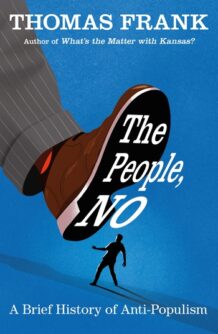And now.
Thomas Frank’s most-recent book, The People, No: A Brief History of Anti-Populism—newly available in paperback later this month—generally shows that everything we think we know about populism is wrong. Populism, by his telling, historically has widened the promise of a decent life for all Americans. It has also garnered a hostile reaction from elites, who historically have detested it and lashed out at its concerns and those who voice them.
Foundations have been and are among the institutions controlled by these elites, and they are referenced by Frank—whose previous books include the well-received and oft-cited What’s the Matter with Kansas?: How Conservatives Won the Heart of America, about his native state—in ways as relevant to the country’s current cultural, economic, and political situations as much as is the whole of his history.
In The People, No, Frank recounts the invention of the word “populist” by a group of passengers on a train bound from Kansas City to Topeka in May 1891. “In so naming themselves, the original Populists were consecrating a brand-new third-party movement that aimed to break the grip of conventional politicians and conventional ideas,” according to Frank. The party itself was officially created at a conference in Cincinnati later that month.
Angry insurgents
“The organization’s formal name was the ‘People’s Party’; it was mainly composed of angry farmers, insurgent agrarians who, in an enormous electoral surprise, had upended the political system in Kansas some six months previously,” he continues. “The farmers’ revolt against the existing two-party system had quickly spread to other states ….”
Populists were called “calamatyites” by Kansas Republicans who thought they complained all the time and a “mob” by The Kansas City Star. As quoted by Frank, the Star editorialized that the Cincinnati conference was “distinguished for its intolerance and extreme bigotry,” and The Topeka Capital’s front-page news coverage of the event reported that Kansas attendees had “hayseed in their hair” and “proclaim[ed] their politics by the uncouthness of their personal attire.”
Certainly sounds deplorable.
Prestigious conferences
“The specific reforms for which the People’s Party stood are largely forgotten today. But the insults and accusations with which Populism was received in 1891 are alive and well,” Frank writes in The People, No.
You can read them in best-selling books, watch them flashed on the PowerPoint at prestigious foundation conferences, hear the words of the Kansas City Star and the Topeka Capital mouthed by people who have never heard of Topeka, Kansas: Populist movements, they will tell you, are mob actions; reformers are bigots; their leaders are blaitherskites; their followers are mentally ill, or ignorant, or uncouth at the very least. They are cranks; they are troublemakers; they are deplorables. And, yes, they still have hayseed in their hair.
Later in the book, Frank laments some of the elite’s recent failures—specifically, “deindustrialization, financial crisis, opioid epidemic, [and] everything related to the 2016 election” among them. “On the subject of elite failure, there is no international program of inquiry as there is with populism,” he notes.
There are no calls for papers, no generous foundation grant program, no Stanford global elitism project, no incentives at all to discover why experts keep blundering. Indeed, anti-populists find it harder to criticize their colleagues for fouling things up than they did to deride the voting public of America for being angry over those foul-ups.
These elites, including those in establishment philanthropy, are a defensively self-protecting class, Frank thinks—very much in line with what Christopher Caldwell, Joel Kotkin, Michael Lind, and Fred Siegel have also recently written, among others, and not inconsistent with some of George Packer’s published reasoning.
Professionals’ prerogatives
Frank further addresses this same prerogative-preserving self-defensiveness in Le Monde Diplomatique this month, writing that it’s gone so far as to constitute hysteria. In the cogent article, he overviews some of the current elite hostility to populism.
“At one point in his handbook for resisting the coming dictatorship,” as Frank describes Yale historian Timothy Snyder’s On Tyranny: Twenty Lessons from the Twentieth Century, Snyder
addresses himself to professionals, imploring them to start thinking of themselves as a class, which he suggests would allow them to wield ‘a certain kind of power’.
This kind of invocation is actually a persistent theme in the hysteria corpus; the only way to stop what was called ‘authoritarianism’ was to reinforce the power of society’s traditional authorities—its authorised authorities, if you will—by which I mean the highly educated cohort who make up our commentary class, our professors, journalistic elite, financiers, doctors, our law school deans, tech geniuses and so on.
Establishment progressive philanthropy would certainly seem to fit here, too. One wouldn’t think Frank would disagree.
Respect and self-regard
“In the hysteria school, there is nothing to be feared from the exercise of power by this group of authorities; indeed, even if we have to use censorship and surveillance to force people to accept authorised authority, it will be a fair and tolerant course of action,” Frank continues in the Le Monde Diplomatique piece (emphases in original).
“The idea was elaborated in countless ways during the Trump era,” he concludes. “Trump is what you get when you doubt authorities, authorities would write. The variations on the theme were endless, and all of them came together on the essential point: respect your betters. Or else.”
And, in the case of philanthropy, certainly keep according them the “respect”—the benefit—of a special, tax-preferenced vehicle through which to so self-regardingly pursue their activities, and hold their anti-hayseed contempt.
Maybe downright deplorable itself, at least lamentable.



